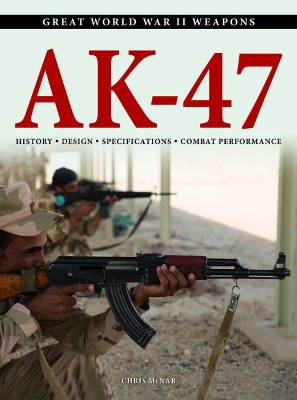Great World War II Weapons
1 total work
The AK-47 is possibly the most influential firearm in the history of small arms. It emerged from the mind of Mikhail Kalashnikov in the mid 1940s as he attempted to solve two problems. First, he set out to solve the awful consequences of German supremacy in arms over the Soviet infantry of the Eastern Front, something Kalashnikov had witnessed during combat as a tank commander. Second, the Russian military authorities had developed a new 'intermediary' bullet - the 7.62mm M43 - which needed a new style of rifle to fire it. A competition was opened, and, against some of the best Russian designers, a precocious young Kalashnikov set to the task.
The result was the AK-47. Launched in 1947 - hence its name - by 1949 its superlative qualities meant that it was accepted as the standard Soviet Army rifle. The AK-47 was cheap to make, lethal in combat and easy to use. With a fast rate of fire, under 300 metres it was a devastating weapon. Its durability was also extraordinary even when left uncleaned - bury it in mud, snow or sand and it would still fire when dug up. These factors combined to make the AK a superlative infantry weapon.
Including variants, over 80 million AKs have been produced to date. From the deserts of the Middle East and Africa, through jungles of Vietnam and South America, to the icy landscapes of Afghanistan and northern Russia, the AK has featured in almost every conflict since the end of World War II. They arm many of the world's largest armies. They have also become one of the world's biggest security problems, appearing in terrorists hands in every corner of the globe and selling for as little as $6.
The AK-47 is a complete and vividly illustrated account of this incredible weapon. Its history and development are charted in close detail. The techniques of maintaining and firing it are exhaustively explained. The book includes a country-by-country account of the AK variants and copies produced, bringing the AK history up to date. Most importantly, the impact of the AK on the battlefield is assessed, evaluating the AK's performance, ammunition and tactical usage in actual combat. Through exploring these themes, The AK-47 builds into an authoritative work on one of the few weapons that have genuinely changed the balance of power across the world.
The result was the AK-47. Launched in 1947 - hence its name - by 1949 its superlative qualities meant that it was accepted as the standard Soviet Army rifle. The AK-47 was cheap to make, lethal in combat and easy to use. With a fast rate of fire, under 300 metres it was a devastating weapon. Its durability was also extraordinary even when left uncleaned - bury it in mud, snow or sand and it would still fire when dug up. These factors combined to make the AK a superlative infantry weapon.
Including variants, over 80 million AKs have been produced to date. From the deserts of the Middle East and Africa, through jungles of Vietnam and South America, to the icy landscapes of Afghanistan and northern Russia, the AK has featured in almost every conflict since the end of World War II. They arm many of the world's largest armies. They have also become one of the world's biggest security problems, appearing in terrorists hands in every corner of the globe and selling for as little as $6.
The AK-47 is a complete and vividly illustrated account of this incredible weapon. Its history and development are charted in close detail. The techniques of maintaining and firing it are exhaustively explained. The book includes a country-by-country account of the AK variants and copies produced, bringing the AK history up to date. Most importantly, the impact of the AK on the battlefield is assessed, evaluating the AK's performance, ammunition and tactical usage in actual combat. Through exploring these themes, The AK-47 builds into an authoritative work on one of the few weapons that have genuinely changed the balance of power across the world.
